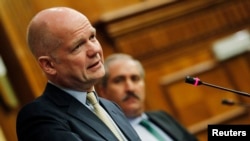British Foreign Secretary William Hague says the Syrian government is "increasingly dependent" on foreign support, marking a threat to regional security that shows the urgency of talks to find a political solution to the country's crisis.
He spoke Wednesday in Amman, Jordan, where top diplomats from 11 countries in the so-called Friends of Syria group are set to discuss a proposed Syrian peace conference.
Organizers want to hold those negotiations involving the Syrian opposition and President Bashar al-Assad's government next month. Hague stressed the need to set a date in the next few days and bring an end to the "appalling violence" in Syria.
He said that unless the Syrian government is ready to take part in negotiations, it will end up presiding over the "complete collapse of their country."
"If the regime were to think they can just win a military victory and somehow go back to whatever was normal before, I think they will be making a terrible error, a catastrophic error. They need a political solution, whatever the circumstances on the ground at the time," he said.
U.S. Secretary of State John Kerry on Wednesday will address the meeting, which brings together a group of nations that back the Syrian opposition.
Senior U.S. analysts describe the talks as part of a broader U.S. effort to work with allies on the Syrian conflict.
Jordan says top envoys from Britain, France, Germany and Italy, as well as Egypt, Qatar, Saudi Arabia and the United Arab Emirates will attend the meeting.
Jordanian Foreign Minister Nasser Judeh, speaking alongside Hague, said the violence, bloodshed and the suffering of the Syrian people must end. He also expressed a need to address the humanitarian pressures facing Jordan.
The United Nations says the crisis in Syria has forced 1 million Syrian civilians into makeshift camps on the borders of Jordan, Lebanon and Turkey.
Neither the Syrian government nor the opposition has committed to attend the proposed peace conference, and analysts say it is far from certain the talks will soon take place.
The issue of Iran's involvement in the proposed meeting has divided the United States and Russia. Moscow says Iran should take part, while the United States has in the past objected to Iranian involvement.
However, U.S. officials say no delegations have yet been ruled in or out of the conference. France said last week it does not want Iran there.
Hague also discussed a push by Britain and France to amend the European Union's arms embargo on Syria to allow weapons shipments to the opposition. He said Europe must decide by the end of the month only whether to alter those rules, and that any decision about actually sending arms will come later.
Some information for this report was provided by AP, AFP and Reuters.
He spoke Wednesday in Amman, Jordan, where top diplomats from 11 countries in the so-called Friends of Syria group are set to discuss a proposed Syrian peace conference.
Organizers want to hold those negotiations involving the Syrian opposition and President Bashar al-Assad's government next month. Hague stressed the need to set a date in the next few days and bring an end to the "appalling violence" in Syria.
He said that unless the Syrian government is ready to take part in negotiations, it will end up presiding over the "complete collapse of their country."
"If the regime were to think they can just win a military victory and somehow go back to whatever was normal before, I think they will be making a terrible error, a catastrophic error. They need a political solution, whatever the circumstances on the ground at the time," he said.
U.S. Secretary of State John Kerry on Wednesday will address the meeting, which brings together a group of nations that back the Syrian opposition.
Senior U.S. analysts describe the talks as part of a broader U.S. effort to work with allies on the Syrian conflict.
Jordan says top envoys from Britain, France, Germany and Italy, as well as Egypt, Qatar, Saudi Arabia and the United Arab Emirates will attend the meeting.
Jordanian Foreign Minister Nasser Judeh, speaking alongside Hague, said the violence, bloodshed and the suffering of the Syrian people must end. He also expressed a need to address the humanitarian pressures facing Jordan.
The United Nations says the crisis in Syria has forced 1 million Syrian civilians into makeshift camps on the borders of Jordan, Lebanon and Turkey.
Neither the Syrian government nor the opposition has committed to attend the proposed peace conference, and analysts say it is far from certain the talks will soon take place.
The issue of Iran's involvement in the proposed meeting has divided the United States and Russia. Moscow says Iran should take part, while the United States has in the past objected to Iranian involvement.
However, U.S. officials say no delegations have yet been ruled in or out of the conference. France said last week it does not want Iran there.
Hague also discussed a push by Britain and France to amend the European Union's arms embargo on Syria to allow weapons shipments to the opposition. He said Europe must decide by the end of the month only whether to alter those rules, and that any decision about actually sending arms will come later.
Some information for this report was provided by AP, AFP and Reuters.










